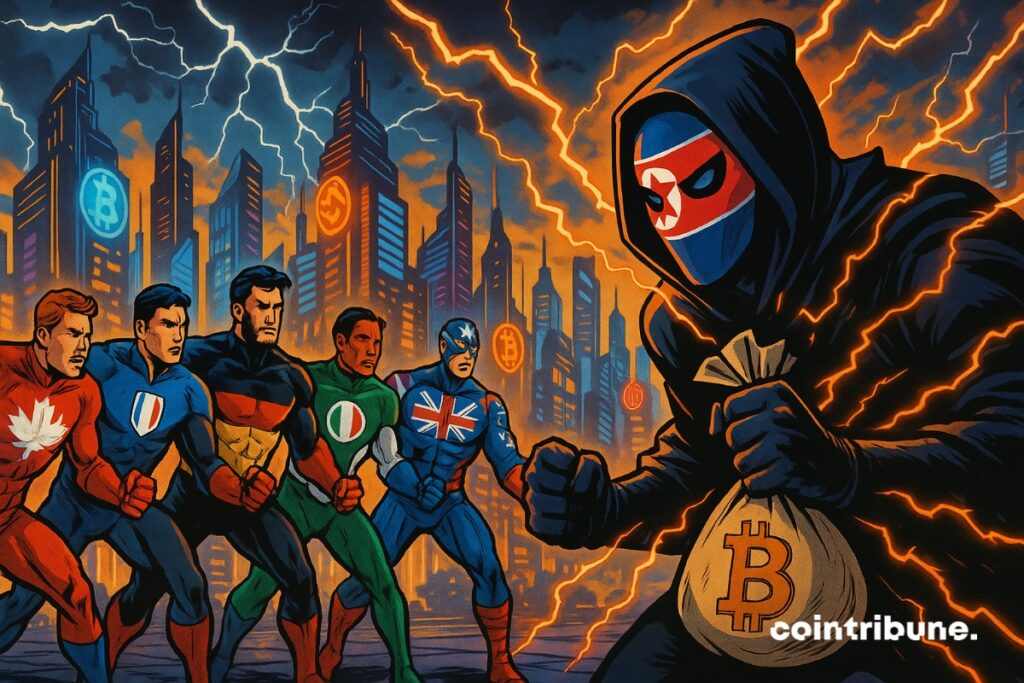16h05 ▪
4
min read ▪ by
Digital warfare knows no borders. Just weeks before the G7 summit, cyberattacks orchestrated by North Korea through crypto platforms have become a global security priority. A coordinated response is taking shape in the face of a threat that combines technology, finance, and political strategy.


In Brief
- The G7 is preparing a joint response to North Korean crypto hacks ahead of the June 2025 summit.
- North Korea funds its nuclear program through massive crypto attacks, with $1.34 billion stolen in 2024.
- A task force and traceability rules are under study to secure the global crypto ecosystem against this state threat.
A Systemic Cyber Threat Fueled by Cryptos
For several years, North Korea has been using cryptocurrencies to bypass international sanctions. The Lazarus Group, the spearhead of this strategy, has made crypto platforms its prime target. In 2024, 47 attacks attributed to Pyongyang resulted in the theft of $1.34 billion. These funds notably support the regime’s nuclear program, according to U.S. intelligence.
The Bybit hack in February 2025, estimated at $1.5 billion, marked a turning point. Intrusions are no longer limited to systems: North Korean agents now infiltrate crypto startups posing as developers.
The G7 Wants to Structure a Transnational Response
The G7 members, who will meet in June in Alberta, have included the topic of cyberattacks in their strategic agenda. Washington, Tokyo, and Seoul have already issued joint alerts, emphasizing the need for real-time information sharing between platforms, states, and intelligence agencies. It is in this context that the G7 discussions on the North Korean cyber threat will take place.
The objective is twofold:
- Neutralize the effectiveness of North Korean operations;
- Protect the integrity of the international crypto market.
Discussions about creating a dedicated task force are underway, with emphasis on tracking crypto transactions and regulating anonymous wallets. Several approaches are being considered in strategies to counter Pyongyang’s crypto hacks.
The Crypto Ecosystem Under Pressure
For players in the crypto sector, these attacks raise a dual challenge:
- Operational cybersecurity;
- Reputational risk.
Institutional investors now demand stronger guarantees, while some platforms are considering relocating their infrastructure or imposing more frequent security audits. This growing requirement also impacts bitcoin players, who are particularly exposed to this threat.
The Bybit case revealed the limits of existing defense systems against nation-states. To restore trust, crypto companies will need to collaborate with governments while preserving the decentralization principles that underpin their appeal.
What the G7 is preparing in June 2025 is not just another agreement. It is a doctrine of digital deterrence against states using crypto hacking as a geopolitical lever. In this asymmetric war, control of digital flows becomes as strategic as that of raw materials. North Korea has understood this and is now one of the largest bitcoin holders in the world. The question remains whether the G7 democracies will be able to respond with the same agility.
Maximize your Cointribune experience with our “Read to Earn” program! For every article you read, earn points and access exclusive rewards. Sign up now and start earning benefits.
The world is evolving and adaptation is the best weapon to survive in this undulating universe. Originally a crypto community manager, I am interested in anything that is directly or indirectly related to blockchain and its derivatives. To share my experience and promote a field that I am passionate about, nothing is better than writing informative and relaxed articles.
DISCLAIMER
The views, thoughts, and opinions expressed in this article belong solely to the author, and should not be taken as investment advice. Do your own research before taking any investment decisions.

